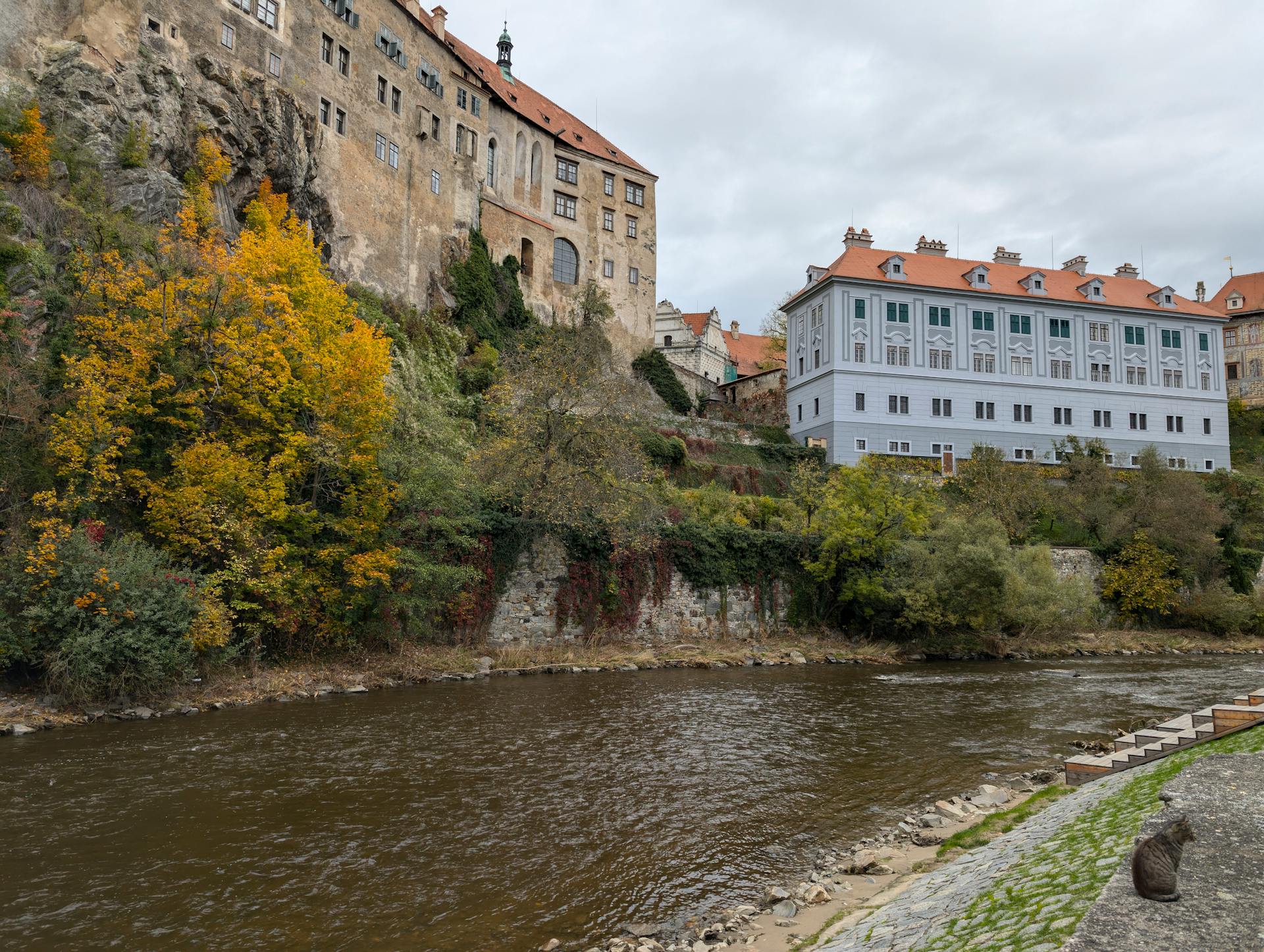
Welcoming a Cesky Terrier puppy into your family is a thrilling experience, but it's essential to be prepared for the responsibilities that come with it.
Cesky Terrier puppies are prone to certain health issues, such as patellar luxation and eye problems, which can be costly and time-consuming to manage.
Cesky Terriers are highly intelligent dogs that thrive on mental and physical stimulation, making them a great fit for active families.
Regular exercise and training sessions can help prevent behavioral problems and strengthen the bond between you and your Cesky Terrier puppy.
A different take: Cesky Terrier Puppies for Sale
Health and Genetics
As a Cesky Terrier owner, it's essential to be aware of the breed's potential health concerns. Cesky Terriers are generally a healthy breed, but they can be prone to certain issues.
Their life expectancy is between 12 to 15 years, which is a relatively long lifespan for a dog. However, they can be susceptible to inherited health problems, just like most purebred dogs.
Recommended read: Cesky Terrier
Some common health issues that may affect Cesky Terriers include patellar luxation, cataracts, cardiac problems, and progressive retinal atrophy. It's crucial to work with a responsible breeder who regularly tests their breeding dogs to ensure the puppies are healthy.
Brushing your Cesky Terrier's teeth daily can help prevent periodontal disease, which is a common health issue in dogs. Regular dental care can also help prevent other health problems, such as bad breath and gum disease.
Here are some potential health issues that may affect Cesky Terriers:
- Patellar luxation
- Cataracts
- Cardiac problems
- Progressive retinal atrophy
It's also essential to monitor your Cesky Terrier's joints for signs of hip dysplasia and elbow dysplasia, which can lead to arthritis. Regular exercise and a healthy weight can help prevent these issues.
If you notice any unusual signs or symptoms in your Cesky Terrier, it's always best to consult with a veterinarian to rule out any potential health problems. By being aware of these potential issues and taking preventative measures, you can help ensure your Cesky Terrier lives a long and healthy life.
Explore further: Healthy Bull Terrier
Care and Maintenance
Caring for your Cesky Terrier puppy requires attention to detail and a commitment to regular maintenance.
To keep your puppy's coat looking its best, brush it at least weekly, and clip it 3-4 times a year. Cesky Terriers generally have good teeth, and brushing them at least twice a week will keep them perfect.
Supervise your puppy as you would a toddler, keeping doors closed, picking up after yourself, and blocking off rooms as necessary. This will keep your puppy out of trouble and away from objects she shouldn't put in her mouth.
Weekly ear cleaning is essential, even for puppies. You can learn how to do this with your veterinarian's guidance.
Cesky Terriers are well-suited to apartment life, but they still need daily walks and frequent play sessions.
To avoid over-exercising your puppy, start with regular but gentle exercise and gradually increase the intensity and duration.
Feeding a high-quality diet appropriate for your puppy's age is crucial. Consistency is key, so stick to a single diet and avoid giving your puppy people food.
Related reading: Shiba Inu Reaching 1 Cent
Here's a quick rundown of essential grooming tasks:
- Brush your puppy's coat at least weekly
- Clip your puppy's coat 3-4 times a year
- Brush your puppy's teeth at least twice a week
- Clean your puppy's ears weekly
- Trim your puppy's nails regularly
- Check your puppy's ears frequently
Regular grooming will help prevent tangles, reduce shedding, and keep your puppy looking and feeling its best.
Size and Appearance
The Cesky Terrier is a small breed that stands between 9.75 and 12.5 inches at the withers.
Their ideal weight ranges from 14 to 24 lb, which is a great size for a dog that's meant to be energetic and playful.
The Cesky Terrier should be 1.5 times as long as it is tall at the withers, giving them a balanced and rectangular format.
Their neck should be medium to long in length, with some loose skin around the throat area, which results in strong shoulders and a medium-length body.
The front legs should be strong and straight, while the back legs should be powerful and parallel to one another.
The Cesky Terrier's head is long with a slight arch in the back of the skull, and their muzzle should appear triangular but not snipey.
A different take: Straight Back German Shepherds
Their eyes should be deep set, medium in size, and have a friendly expression, and their ears should be triangular in shape and medium in size.
Their coat can be shades of gray from charcoal to platinum, or rarely brown, and should be long, silky with slight texture.
The Cesky Terrier should move quickly, with plenty of power and drive propelling it forward, and their gait should be vigorous with the front legs moving in a straight line.
Temperament and Training
The Cesky Terrier is a breed that's not for everyone. They're a rambunctious bundle of energy, enjoying hunting and digging, and requiring daily exercise in a secure yard.
Cesky Terriers love going for walks and chasing and retrieving balls, but they dislike being left alone for long periods of time. If left alone for too long, they may become obnoxious barkers and develop separation anxiety.
A Cesky puppy will benefit from daily walks and visits to dog-friendly locations where they can meet new people and see, smell, and hear new things. This will help them become less wary of strangers.
See what others are reading: Lancashire Heeler News
The Cesky is an excellent watchdog due to its alert nature, wariness of strangers, and deep, loud bark. They're devoted to their owners, but a lack of socialization during puppyhood can make them wary of, if not fearful of, strangers.
Because of their intelligence, Cesky Terriers are easy to train, and they typically grasp the fundamentals of house training and obedience relatively quickly. Basic lessons can begin as early as eight weeks of age.
The Cesky can have a dominating temperament, so proper socialization is essential, especially with cats and similar-sized dogs. They can coexist peacefully with well-behaved children and can be taught to coexist with other animals.
Cesky Terriers enjoy learning new tricks, which is an excellent opportunity to exercise their mind while strengthening your bond. Just remember to keep training sessions brief and enjoyable.
Exercise and Nutrition
One hour of activity per day, such as walks, running in the yard, or playing games, is enough to keep your Cesky happy.
Cesky Terriers love to join their owners for long walks every day, and they can even keep up with a jog.
Their small stature may limit their ability to scramble up rocks or cross rivers, so consider this when planning outdoor adventures.
These dogs were bred to be avid hunters, so keep them on a leash or safely inside a fence to avoid a wild chase and dangerous situations.
Playing games with your Cesky is a great way to provide them with the physical and mental stimulation they need.
Finding a Puppy
Cesky Terriers are relatively rare dogs, especially in the US, so be prepared to wait if you're interested in bringing one home.
You can expect to be put on a waiting list if you're looking to get a Cesky Terrier puppy from a reputable breeder.
They can still mostly be found in their native land – the Czech Republic, where they originated.
If you're unable to find a Cesky Terrier puppy in the US, consider searching for one in Europe.
You might like: One Eyed Shih Tzu
Frequently Asked Questions
Is the Cesky Terrier rare?
Yes, the Cesky Terrier is considered one of the rarest dog breeds worldwide. It's a highly sought-after breed, making it a unique addition to any family.
Do Cesky Terriers shed?
No, Cesky Terriers are low-shedding dogs. Regular grooming is necessary to remove dead hair.
Featured Images: pexels.com


